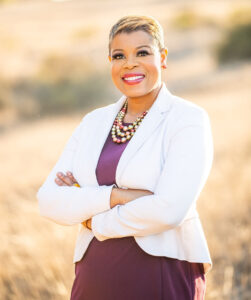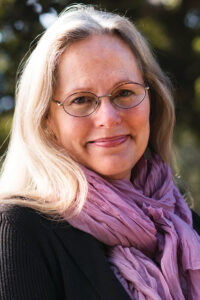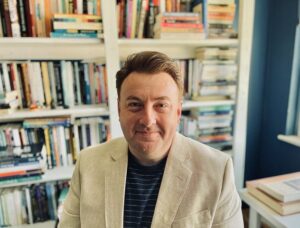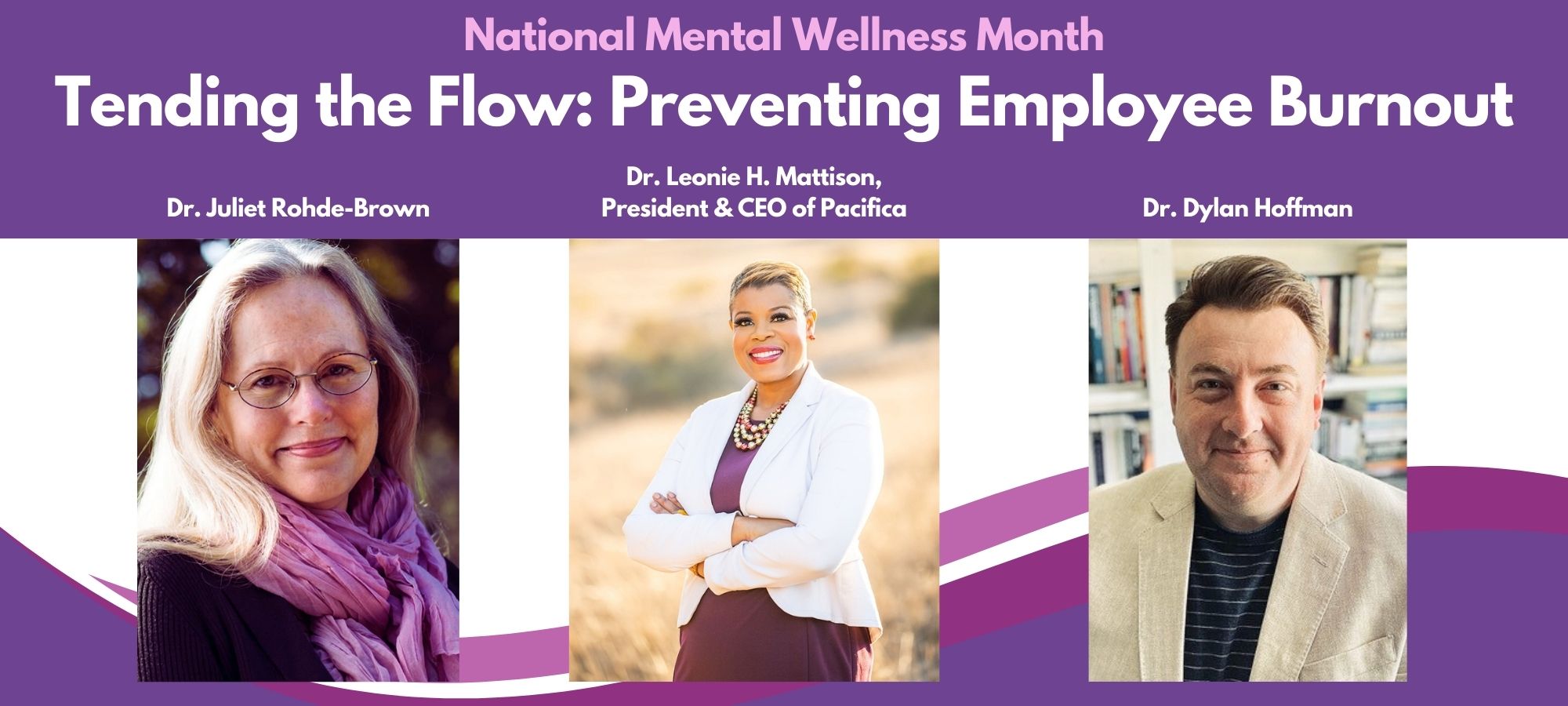Employee burnout is a universal issue not only external to Pacifica but within our community. It highlights our responsibility as an institution to share our insights on the topic. January is Mental Wellness Month, and Dr. Leonie H. Mattison, President & CEO of Pacifica; Dr. Dylan Hoffman, Co-Chair of our Jungian Psychology and Archetypal Studies Program; and Dr. Juliet Rohde-Brown, Chair of the Integrative Therapy and Healing Practices Program, gathered to discuss this issue, which can have such a fundamental effect on mental wellness.
Dr. Lee: From a depth psychological perspective, I view Pacifica as having a soul. And organizations can become sick, when we’re not flowing from who we are and feel disconnected and there’s disillusionment because of this clog or restriction. I recently was walking by the ocean and a river running to it was clogged by wood, so the water was barely flowing into the ocean. To me, that’s a great description of burnout. People come to Pacifica because we believe it has a soul. When we talk about an organization, who is it? The people working at Pacifica ARE Pacifica. So we’re drawn to one another. There’s an expectation of what it should look like and feel like. I’ve heard people say, “It feels odd together here. It’s not flowing like it should.” When we’re not freely flowing, that’s a great example of what employee burnout could look like. Although when the hero or the savior shows up, I get burned out personally, and I’m aware of that. Awareness is part of preventing burnout, as is having support systems to remove the clog, be it meditation, ritual, or a friend. We need resources to freely flow out and allow what comes in to fill us up. When the y burns out, we’re not fulfilling our potential as we’re called to. It’s hindered, which impacts the entire organization. So even though we don’t like the savior archetype, it just wants to help, as does the healer archetype.
Dr. Hoffman: That’s what complexes, as Jung described them, can do when we’re unconscious of them. They can act like a clog in a passageway that holds energy in restrictive ways. And so we react to things based on unhealed wounds of the past that color our perceptions of the present, which inhibits our full participation in our ongoing life rather than allowing us to be in the moment and respond to what is actually happening. Archetypes are sources of energy that want to move into us to make us whole, and through us in service to the world. Complexes divert their energy, holding it in ways that we can’t receive or give.
Dr. Rohde-Brown: If we’re using the river metaphor, the logs can burst and the water can flood. Yet, the logs can also gently be there to sometimes slow us down, so we don’t lash out at others or retreat and remain stagnant.
Dr. Lee: We need to take ownership not just of ourselves but of the institution. How do we recognize the clog and discern when it’s okay to let it be and when to guide it to release. I attach it to soul. When the soul needs to rest and is sending a message to us, how do we recognize it before burnout? What are the signs and symptoms?
Dr. Rohde-Brown: Meditative practices will always help us recognize the signs: fatigue, a sense of anxiety that can’t be pinpointed, and compassion fatigue. Those are a few.
Dr. Hoffman: From the soul perspective, we may need to take unfamiliar pathways, and learn new ways of operating, rather than following well-worn tracts that feel safe for the ego but are out of flow with the soul’s deeper currents and purposes. Again, it is a matter of discernment. That is part of soul work, to sit with frustration and ask, am I being tasked with something new but necessary and just feeling uncomfortable entering new terrain—preferring the familiar over what is best for my life and my work—or is my frustration revealing something that is in fact getting in the way of the soul’s deeper currents and purposes and so blocking me from what is best for my life and my work?
Dr. Lee: Soul has been vacuumed out of so many institutions. This is an invitation to bring soul back into that river, to remind workers that they are souls. What role do dreams play in this? And how will we help leaders and institutions understand the importance of tending soul at work?
Dr. Rohde-Brown: We need to be more curious about each other and meet together to share dreams and maybe share our biggest hopes and fears in our work. We’re functioning in a blend of online and in-person formats, but there’s something very rich about being in person in circle together and sharing your biggest hope. To be seen, to be heard, to be curious. Paths to enter into the depths, to be relational, to flow with each other. There are pragmatics and policy aspects that need to get done but at least those of us who are employed here can do things like this gathering and discussion together. I appreciate that.
Dr. Hoffman: I think in terms of wholeness. In order not to be burned out, you need a narrative about how the thing you’re doing is connected to your life as a whole. And if those threads are severed, we can’t articulate to ourselves how our jobs are in relation to why we exist. I think that’s when we break down individually. That’s when soul comes into it, that larger capacity to imagine who I am right now in relationship to my children, my spouse, my work. You have to be able to connect those dots to give everyone a reason to show up.
Dr. Lee: I think we’re on to something. This is an example of listening to learn, being present. We need more of that. Next year we’re going to have conscious community conversations and show up and be present. We need to speak to one another’s souls. The soul of each of us is yearning for this. Employee burnout is a sickness of the soul.
Asking people what it means to them is a good place to start. I don’t ever want to have to change myself in order to fit in. And I don’t want our faculty, staff, or employees to have to fit in, in order to belong. We don’t want to be shells or skeletons of who we are. It’s never going to work. I’m committed to show up with soul, to learn, and to recognize when the shadow shows up I need to say that I need help. I will also see the beauty and blessings in this windy road of leadership. I want all of us to be empowered to speak up and share.

At the helm of Pacifica Graduate Institute, Dr. Leonie H. Mattison (Dr. Lee) serves as President and CEO, guiding an institution defined by transformative education, research innovation, and culturally responsive care for the soul in the world—a mission she has upheld throughout her distinguished career. With leadership experience spanning higher education, non-profit, government, and the private sector, Dr. Lee has innovated organizational and talent development structures, overhauled learning institutions to enhance student access and employee engagement, and spearheaded national public health research and initiatives to improve health outcomes.
Inspired by depth psychological and spiritual approach to trauma recovery, she ingeniously fashioned the T.H.R.E.A.D. healing toolkit following a near-death stroke. The toolkit with its six step T.H.R.E.A.D framework—Think outcomes, Harvest lessons, Release pain, Enlist allies, Adopt a new mindset, Dream of a new self—serves as a transformative guide for self-discovery, healing, and personal growth. Infused with the essence of soulful well-being, it empowers individuals not only to recover but to thrive in life’s journey.
Dr. Mattison is an author, mother, and the first Black woman to lead an institution dedicated to depth psychological and psychodynamic domains. Her bold vision for Pacifica is to make depth psychology universally accessible. She consistently demonstrates her commitment to access, equity, and support for survivors to heal from trauma, invoking joy, faith, and resilience to fulfill her calling. An advocate for student success, women in leadership, and diversity in higher education, Dr. Lee embodies a commitment to caring for the world’s soul one individual at a time.

Juliet Rohde-Brown, Ph.D. is the Chair for the Depth Psychology: Integrative Therapy and Healing Practices doctoral specialization program at Pacifica Graduate Institute. She has been teaching psychology in higher education venues for over 20 years. Her clinical doctoral internship was completed at the C.G. Jung Institute of Los Angeles and she has worked clinically in private practice and hospital settings. Before becoming a licensed clinical psychologist, she did integrative work as a hypnotherapist and trained in neuropsychological assessment and in-patient settings, among others. She is a board member with the nonprofit organizations, Tierra Sagrada and Restorative Justice Resources and serves as a mentor with the Spiritual Paths Foundation. She has presented on psychological and interspiritual topics internationally, led and co-led retreats and workshops, and her book is entitled Imagine Forgiveness. Her peer reviewed journal articles have been featured in such publications as the Journal of Humanistic Psychology, the Journal of Divorce and Remarriage, Sutra – The Thread: Journal for Research on Education, Psychology, Traditional Sciences and Systems, Health and Consciousness and Psychological Perspectives, Journal of Jungian Scholarly Studies, and she has contributed book chapters to Probing the Boundaries Series: Vol. 172- Forgiveness: An interdisciplinary dialogue (Interdisciplinary Press), Humanistic Psychology and Diversity (Routledge), and “Like A Child Would Do”: A Multidisciplinary Approach to Childlikeness in Past and Current Societies (Universitas Press).

Dylan Hoffman, Ph.D., is core faculty and co-chair of the Jungian and Archetypal Studies specialization in the M.A./Ph.D. program in Depth Psychology at Pacifica Graduate Institute. His work focuses on C. G. Jung’s view of archetypes as the deepest energies of the psyche—how they interconnect spirit, psyche, and matter as numinous and mythic powers that animate, govern, and structure the cosmos as a whole. Dylan grounds his work in indigenous/shamanic and decolonial perspectives and practices that provide a primordial, holistic, and sacred worldview within which to understand the archetypal psyche, to embody its wholeness individually and relationally, and to live in service to an ensouled and enchanted world.


